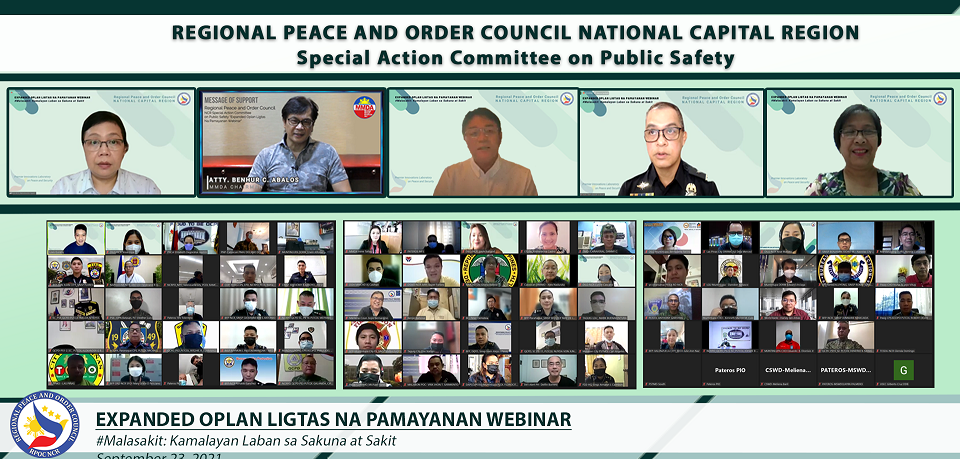
The Regional Peace and Order Council-NCR (RPOC-NCR) led, on September 23, 2021, the Expanded Oplan Ligtas na Pamayanan (OLP) Webinar with the theme #Malasakit: Kamalayan Laban sa Sakuna at Sakit. The virtual meeting was conducted via Zoom.
The event, moderated by Mr. Jules Guiang, Founder and National Convener, 2030 Youth Force in the Philippines, Inc., aimed at facilitating the dissemination and exchange of the latest information on road safety, fire prevention, COVID-19 response, and lifestyle diseases.
In attendance were the 17 NCR-LGUsâ offices involved in the public safety sector. Representatives include the City and Municipal Health Office, Public Information Office, City and Municipal Fire District Office, Local Disaster Risk Reduction Management Office (LDRRMO), Traffic Management Office (TMO), Local Social Welfare and Development Office (LSWDO), as well as the Regional Line Agencies of the Council.
RPOC Chairman and Paranaque City Mayor Edwin L. Olivarez expressed the sentiment that while NCR remains the epicenter of the COVID-19 pandemic, NCR-LGUs can accelerate the return to normal through greater coordination and clear delineation of tasks in the fight against the pandemic.
Fire Chief Superintendent Gilbert D Dolot, Regional Director of the Bureau of Fire Protection-NCR (BFP-NCR) and Lead of the RPOC Special Action Committee on Public Safety (SAC PS), set the direction of the webinar by highlighting the thrust of the BFP-NCR which is to mainstream a âfire prevention and preparednessâ mindset among Filipinos.
Speaking for the Metro Manila Development Authority (MMDA), Chairman Benjamin âBenhurâ Abalos Jr. and Co-Lead of RPOC SAC PS, outlined the wide range of concerns that MMDA covers, among them: Transport System, Traffic Management, to name a few, on top of added responsibility in the COVID-19 vaccination effort. As far as the latter is concerned, Chairman Abalos reported that 87% of eligible Metro Manila residents had received their first doses, while 67% are fully vaccinated.
On the subject of Road Safety, Atty. Crisanto C. Saruca, Jr., Head, MMDA Traffic Discipline Office, outlined how MMDA is implementing its Road Safety mandate by instituting measures such as the 60 kph limit along EDSA, the designation of Motorcycle, Bicycle, and Truck lanes along major thoroughfares, the EDSA Bus Carousel System, Sidewalk Clearing, Street Lighting, construction of footbridges and many more.
Chief Inspector Ronaldo E. Sanchez, Chief of Fire Safety Enforcement of BFP-NCR, traced the beginnings of OLP, which initially was a response to the inherently hazardous situation prevailing among densely populated and congested urban communities in NCR. Over time, it evolved into a full-blown fire safety strategy involving communities with the main goal of reducing fire-related deaths and property damage on a yearly basis.
One of the most interesting developments in road safety in Metro Manila is the establishment of Data for Road Incident Visualization and Evaluation Reporting (DRIVER) System, a high-tech database management system to track road incidents in Metro Manila. The DRIVER System uses information to improve overall road safety by generating the evidence needed to make policy, design programs for road safety, and evaluate their effectiveness. A walk-through of the DRIVER System was provided by Mr. Harvey Ian Arbas, Technical Consultant of the World Bank Manila.
Mr. Albert Jerome D. Casihan, Head of the Health Planning Unit of Metro Manila Center for Health and Development (MMCHD), gave an update on the COVID-19 response and vaccination efforts in Metro Manila. Statistics on infections, recoveries and fatalities was discussed. According to MMCHD, Prevent, Detect, Isolate, Treat, Reintegrate (PDITR) continues to be the central strategy to help the country move towards the âNew Normal.â
The Department of Social Welfare and Development-NCR (DSWD-NCR) focused its presentation on the provision of Family Food Packs (FFPs) for those affected by granular lockdowns and family members in quarantine facilities operated by the government. Mr. Bienvenido V. Barbosa, Jr., OIC of the DSWD-NCR Disaster Response Management Division (DRMD) detailed the FFP supply and distribution system and the role and responsibilities of LGUs in the process, as prescribed in DSWD-NCR Memorandum Circular 11, series of 2021.
Head of the Non-Communicable Diseases Prevention and Control Cluster of MMCHD, Dr. Laila Celino, underscored that while the COVID-19 pandemic may have dominated public attention, Non-Communicable Diseases (NCD) continue to occupy the top tiers of killer diseases in the country, far outstripping fatalities caused by the pandemic. These NCDs are preventable by changes in lifestyle, exercise, proper diet, quitting smoking, and avoiding excessive alcohol consumption.
In the conclusion of the activity, DILG-NCR Regional Director and RPOC-NCR Head Secretariat, Dir. Maria Lourdes L. Agustin emphasized that Public Safety is a multi-faceted concept that encompasses a range of concerns from health to risk mitigation. Agustin added that Public Safety in a modern urban setting is a collective responsibility â citizens, government, and civil society working together for a common purpose. âOplan Ligtas na Pamayanan is what civic engagement is all about, especially in the time of the pandemic,â and in the words of RD Agustin, âWe are all in this together.â
